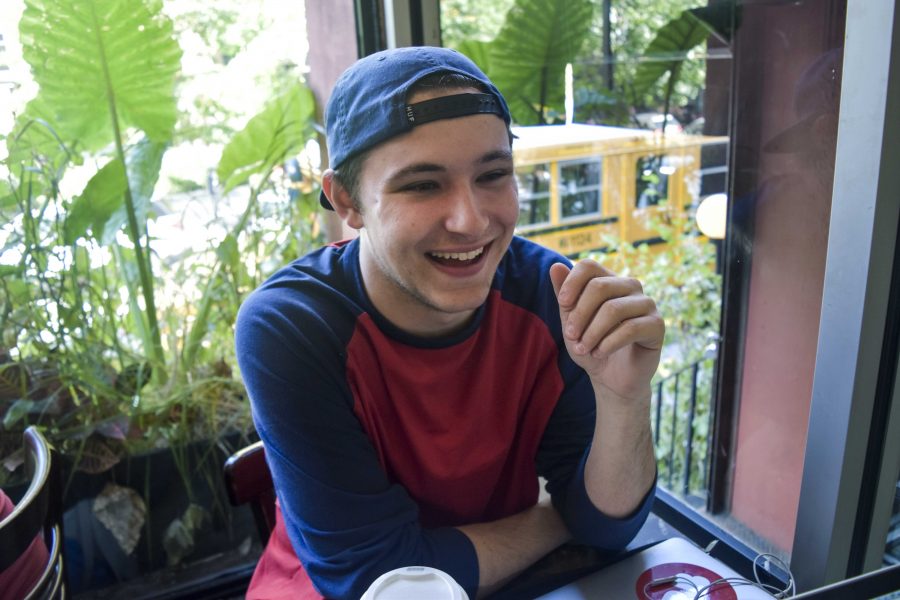Students Juggle Comedy and Classes
Nate Torto has been performing stand-up comedy for about two years.
November 7, 2016
Whether they tell one-liners at open mics, extended stories at showcases or sketches on digital platforms, NYU comedians take every opportunity to hustle and make a name for themselves in the competitive world of New York comedy. Stand-up comedy is its own artistic form, and with hundreds of comedy clubs, New York City provides the perfect platform for these students to get on stage.
Balancing a budding stand-up career with school is hard enough. Being vulnerable in front of an audience you don’t know, having to listen to your jokes bomb and waiting until 2 a.m. to finally get some mic time are just some of the challenges stand-up comedians have to face every time they get on stage. Harrison Herreman, a Tisch junior, insists that it is all about taking stand-up seriously and having passion.
“The most challenging thing about stand up is that to get way better you have to treat it like a job, and that can constantly get in the way of your personal life and school,” Herreman said. “It leads to a lot of late nights. But if you really throw your spirit into it, you can learn a lot about yourself as a person, and you can learn a lot about being funny.”
After dedicating countless hours to watching specials to learn more about the craft, Herreman decided to try it out for himself. He began his college career performing two to three times a week, but quickly got hooked and started doing it more — sometimes up to 20 open mics a week.
Tisch junior Rachel Sennott did stand-up casually her freshman year until she didn’t have time to do it anymore. The spring of her sophomore year, however, she began to deal with depression and anxiety and started doing open mics seriously as an outlet. She now goes to open mics five to seven nights a week and recently performed at her first paying gig.
“I was heckled and called a slut,” Sennott said. “It’s a great time for women in comedy!”
Claire Greising, a Tisch sophomore, agreed that misogyny, unfortunately, abounds in the stand-up world.
“If you aren’t funny, it’s confirming their idea that women can’t be funny,” Greising said. “And if you do well, then you’re funny for a woman. It’s really emotionally taxing, performing for a bunch of old white men who are mad. I have to rev myself up every time.”
The first time Greising tried performing comedy was at her audition for the Astor Place Riots, NYU’s stand up comedy club, where she did a three-minute bit about a guy trying to flirt with her by talking about
Vladimir Nabokov. Now, with a full class schedule and a job, Greising still manages to get onstage two or three times a week.
“If I feel tender, I’ll go to a Laughing Buddha mic because everyone usually laughs and it’s supportive there,” Greising said. “But if I have material I feel good about, I’ll go to one of the mean mics, like The Pit.”
CAS senior Nate Torto, who is also a part of the Astor Place Riots, appreciates the group for the relationships he has built there since he joined at the beginning of his junior year.
“At first, comedy felt so solitary for me because I was going to school during the day and then spending my nights performing in seedy bars with depressed 30-somethings,” Torto said. “So when I was introduced to a bunch of people my age interested in the same thing, it was huge for me.”
Even though Torto has been performing five to 10 times a week for the past few years, he still considers himself a novice.
“I have probably 18 minutes of material that actually works consistently. I’m always writing new stuff, trying it out at open mics and recording it, playing it back and editing it over and over again. When material works the first time you say it, that’s the best feeling,” Torto said. “The high you get from the instant gratification of actually doing well at stand-up is better than any other performance art I’ve tried.”
Recently, Torto got to perform before Michael Che at Lucky Jack’s; the SNL comedian shook his hand and told him his stuff was funny. Torto feels that he has made a lot of progress, but knows he has much further to go.
“I just want to feel successful enough on stage that I could point to my abilities and not feel insane telling my parents that it’s something I want to do when I graduate,” Torto said.
A version of this article appeared in the Nov. 7 print edition. Email Camille Larkins at [email protected]



























































































































































